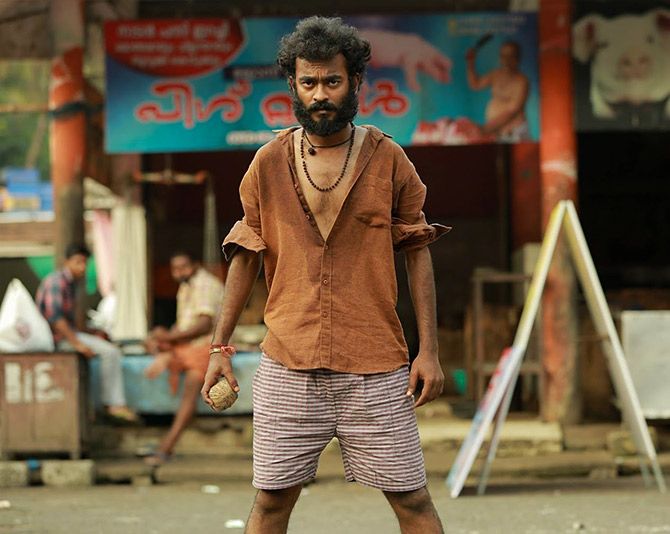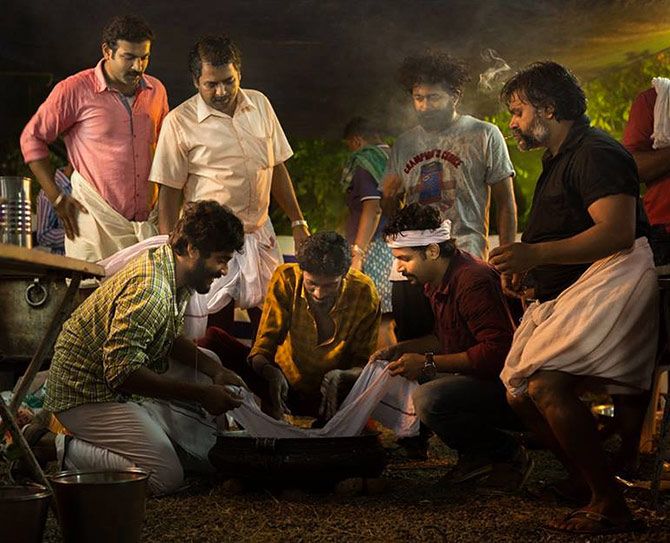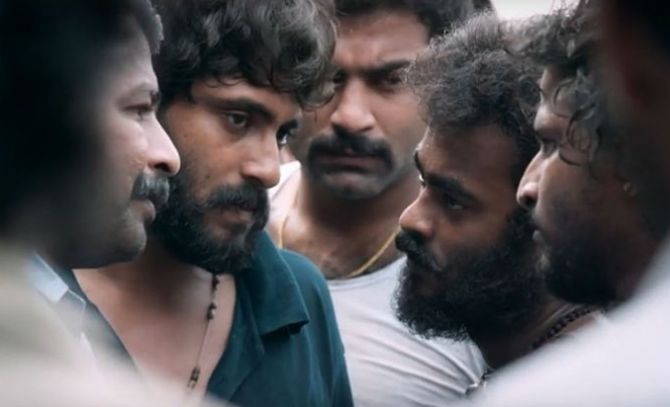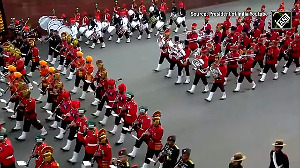'In Angamaly Diaries, dreams, kinks, small corruptions, cheap lives, and hopes are all given their due and that attitude frees us up to believe that perhaps there is more good than bad in the sum total of us.'
'This is a coming-of-age tale taken straight out of a diary written in blood,' says Sreehari Nair.

'You feel like he has emerged straight from the squats of hell, and walked right into the frames.'
There were no chickens slaughtered in Fernando Meirelles' City of God, only chickens sacrificed for the greater cinematic good, and there are no pigs butchered in Angamaly Diaries, only 'honorable pigs who give up their lives for the sake of cinema.'
In Lijo Jose Pellissery's latest picture, pigs are chased, pulled out of their pens in their sleep, bathed, goosed up, and shoved into trucks, as a story slowly develops around these pursuits.
The grunting noises of pigs serve the same purpose as the clucking of hens in City of God -- they interrupt conversations to create a pixilated aural rhythm.
Like the hens in Meirelles' movie, the pigs in Angamaly Diaries seem perpetually suspended in super-alert mode; when a scene cuts from the all-scanning piggy eyes to humans casually making dinner plans, you get the precise difference between 'a little comfort' and 'a lot of desperation.'
In his first four movies, Pellissery had established the credo for his directorial style: he won't take on a subject unless there are cinematic possibilities implicit in it.
If the director flounders in the opening 30 minutes of Angamaly Diaries, it's because the scenes seem like spillovers from his earlier movies -- full of rapid-cuts but without trance, popping heads, and a straining V O that hits its effects too hard.
The initial portions of Angamaly Diaries are like a commercial for the spirit of Angamaly that is less interested in the spirit and more interested in being a commercial.
But once those 30 minutes go by, Lijo Jose Pellissery, almost magically, internalises his tricks and lets his actors take over the scenarios completely.
And what actors!
All those 86 new faces that make up this picture carry worlds inside them, and when these worlds collide, so many patterns co-occur that it makes your head swim.
The episodic narrative culminates in a breathtaking penultimate scene, a 13-minute uncut shot, which I believe is a masterpiece of framing, composition, and acting.
It's a carnival scene; and as the camera glides on, all the principal characters appear: Taunting each other, their egos tussling, a heckle here, a heckle there, babies tossed in the air, drinks gulped in plastic cups, cigarettes lit over church candles, there's the laying on of hands, the music changing from religious to procession to band, revelations happening over overlapping talks, and settling of scores muffled by the sound of firecrackers.
By now the episodic structure has dissolved and the movie is one piece.
If you think about it, the awe-inspiring 3-minute long Copacabana shot in Goodfellas had its motor primarily inside two actors: Ray Liotta and Lorraine Bracco.
Here, there are around a dozen performers dancing away, trying to keep the balls in the air. If you are a cinephile burning with filmmaking fever, this one scene can give you the string warts!
To all those who'd once enthusiastically but incorrectly announced the dawn of the Malayalam New Wave (an entire section of the media had hailed Rajesh Pillai's Traffic as New Wave Cinema while assigning the movie's novelty to its 'multiple narrative structure...' Mother of God!), and to those who've been dissing the Wave without knowing what it really stands for (a good percentage of these purists believe that anything new will scare family audiences away; since movie-watching to them is a by-the-book family activity... like creating Styrofoam Sunflowers), let me tell you there is a New Wave happening in Malayalam cinema.
And it has the potential to overthrow both filmmaking and watching conventions.
The ripples of the Wave were first felt in Maheshinte Prathikaram and (to a lesser extent) in Kammatipadam last year and with Angamaly Diaries now, a definite crest seems like it is taking shape.
This Malayalam New Wave matters because it expresses a new joy for making movies.
These movies feel like they are unfolding in front of you, and yet they don't shy away from telling you that 'these are "movies" you are watching.'
This emphasis on realism coupled with a playful effort to shatter the boundaries of that very realism, this courage for challenging set cinematic techniques and simultaneously taking on grand themes (religion, sex, politics, art... nothing is too much for these brats), can burn screens and overturn viewing-prejudices.
Some of these movies are constructed from bound scripts and others in gonzo fashion, but almost all these movies are reset by their directors as they are shot; an instinct for the cinematic moment is what binds these directors.
Consequently, most of these movies are impressionistic; their plots are what you make of them.
There are no lessons (Patriarchy is such baloney! or any one of those other easy lessons that Mumbai critics do somersaults over), only an intuition for capturing the heightened excitement in a slice-of-life.

There's more testicular strength in that 13 minute uncut shot of Angamaly Diaries than in some of the punch dialogues that Malayalis have been saying by rote. Of course, it had to bruise a few people!
Angamaly Diaries may have its thrust in sudden bloodbaths, but at its core there is a new comic spirit that shines through; it's a deliciously perverse movie where the jokes and the perversions run parallel.
These boys know their land (everything from the bars to the by-lanes to the rubber plantations) so well that no dip or elevation is a surprise to them; they leap over them while still in their natural strides.
In uninterrupted shots, the camera stays with the characters till the end of their sprints and even further when they are all breathless and pleading for a cigarette or shouting at someone to for keeping the TV volume too high.
Pellissery, teaming up with cinematographer Girish Gangadharan, constantly photographs his characters in a state of boil; the moments before and after the action are key here -- the catching of breaths, the drawing of swords, and the dispensing of angry wisdom.
The fights occur when you least expect them to, over the most trivial of matters, and culminate in ways you may have least anticipated.
The violence in Angamaly Diaries is an extension of these boys' behaviour, of their manner, and like every manner closely scrutinised, it takes on shades of comedy.
In a lesser movie, characters would have spelt out their motives, but here they just talk to each other, and we have to insert ourselves into those scenes to understand how the various threads link up and uncoil.

'Tenderfoots. Tenderhearts.'
'Those who stay put in a life of crime, the real professionals have a cold business-like detachment; crime, like politics, isn't for the overtly sensitive.'
If the movie leaves you too open mouthed to deduce an exact 'story,' here's a broad description that may help: Angamaly Diaries is about two rival gangs in Angamaly who frequently come to blows over broken business promises (pig business here is both a source of sustenance and conflicts) and accidental murders.
While there are clear reasons for their scuffles, these boys would have clashed anyway; because, on a psychological level, they are fighting for their share of Angamaly -- it's the canine version of battles where every warrior tries to keep the other puppies off their private streets.
These puppy wars matter in Angamaly, more than in, say, Kollam or Trivandrum, because there is an inherent innocence about people in the northern parts of Kerala that progressively dims out as one travels southward.
In Northern Kerala, people are ready to die for their brothers, shoot up the town for their comrades, and then turn away and forget the faces.
As one goes more South however, the killings become more transactional, and are carried out to make a quick buck.
In Trivandrum, people believe in broadcasting their Wise Guy attitude, while in Angamaly they just shout out their everyday plans, small achievements and inner-most feelings –- all in that sing-songy style of theirs.
Angamaly Diaries is perhaps the only movie I have seen in which even stream-of-consciousness sounds like it has been sung away.
The characters start out by telling us that there isn't a place quite like Angamaly, and by the end their bellows harden, their sense of ownership doubles up, and they seem to be saying: 'This is Angamaly, and I am a part of it!'
As the glamour in these lives sweats off, there also evolves, a slight nod to Lijo Jose Pellissery's Christian guilt.
Pellissery and writer Chemban Vinod Jose have clearly had more religious upbringing than a director like, say, Rajeev Ravi (Kammatipadam), and consequently a feeling of religious torment takes over the scenes; a torment which the writer-director duo concentrate almost entirely inside their leading man Vincent Pepe.
Pepe wants to be like those Angamaly legends he has grown up admiring, but he's also afflicted by the religious burns.
Debutant Antony Varghese who plays Vincent Pepe has the perfect romantic face to contrast his character's grey desires. Throughout the movie, he is constantly being taught the rules of men.
He is forever losing his mundu or being pinned to the ground.
When a blast occurs, Pepe's is the most terrified face, and later he can't wait to evoke that expression in another face.
All his life, Pepe only desires to have the same respect that he once had for those street-legends; but he just can't have it, for there is that choir boy from childhood still lurking inside him.
A toady attitude, a fear of social pressure, and a religious underpinning -- things that weigh Vincent Pepe down -- are the things that his rivals Ravi and Rajan totally lack.
Ravi and Rajan have served their time in jail (for murder, no less) and don't want to be no time-servers no more -- they now use their criminal backgrounds to make fast business deals.
Fast, fast, they go!
Sarath Kumar and Tito Wilson as Ravi and Rajan don't come off as beautiful nuts (which would have been the easy thing to do) but like a two-headed brain.
They are smarties of the street who explode only when they want conversations to be curtailed and situations to be turned their way.
Unlike the other boys who live for a little show of machismo, Ravi and Rajan act crazy because they are profit crazy.
Sarath Kumar as Appani Ravi pitches in with perhaps the finest loud performance in Indian cinema since Manoj Bajpai in Satya.
You feel like he has emerged straight from the squats of hell, and walked right into the frames. Communicating only through silent deliberations or thunderous screeches, Ravi wrecks havoc and stops more than once to remind Vincent Pepe how guarded he is in his sanity.
When he goads Pepe -- who is at the edge of a violent discharge -- it has the same big-brotherly vibe of Toshiro Mifune saying to a man whose life he spares in Yojimbo: 'Go home to your mother and live a long life eating gruel.'
It is humanism of the above sort both in the texture of Angamaly Diaries and in its making that jolts you up.
This is a dark movie but with no place for easy nihilism.
To use a hoary old term, we come to care for each character -- however minor they may be.
The women, for example, even with their condensed screen times are smarter, they are more elemental, their domestic intelligence far sharper than the street intelligence of men; these women are interested in the worlds of their men, and when they decode their tricks, the women mock their men with an expression that suggests: 'Was that your best plan -- really?'
Pellissery and Chemban Vinod Jose seem to be telling us that for all their bloody instincts, these boys are essentially amateurs.
Tenderfoots. Tenderhearts.
Those who stay put in a life of crime, the real professionals (like Ravi and Rajan) have a cold business-like detachment; crime, like politics, isn't for the overtly sensitive.
As an illustration of this fact, there is Ravi's brother-in-law (nicknamed The Woodpecker), a bumblebee who suffers from the Avis complex -- he is the second most violent man in the family, and so he keeps trying harder.
The little lives here are given the comfort of small music. Prashant Pillai's tunes are deliberately easy on arrangement; it is the music of the bench-tapping type and combines brilliantly with lyrics that are kept purposely shallow.
These are the songs one hears not at grand concerts but at toddy shops, yes; the kind that talks about 'going to the church with your girl' or 'the laments of being served sugarless tea.'
And yet, this poetry of small world issues fits perfectly with the personal tone of the movie.
Chemban Vinod Jose (also an actor with a smile which can either light up your room or give you the creeps) is a native of Angamaly and in his role as the scriptwriter here appears to be looking back at his childhood town with fondness; but it's not exploitative or overdone fondness.
Interpreted through Jose's memory notebook, this is a land where if you ask someone for directions, they begin by asking you to reveal your own credentials first.
Lijo Jose Pellissery uses Chemban Vinod Jose's pointers and then gives his actors the confidence to fall freely.
Like Robert Altman, he sits back and asks his actors to perform for him (Pellissery even appears in a passing scene at a meat shop, almost as if saying 'one more, please').
In wanting to make their director happy, almost all the actors dredge up soul-baring performances.
What these performers share can'be termed as just good chemistry; it's actually a love for the same supreme juices of life that they seem to be swirling in together.
Like the deep dives its actors take, Angamaly Diaries (as also the other movies of the Malayalam New Wave) expects you to dive below the 'Polite Depths' and respond fully without falling into the traps of Political Correctness.
The mixture of nostalgia and violence in this movie is intended to bruise you. But then, if you think about it, it's only those songs that bruise you on some level that end up moving you deeply.
In Angamaly Diaries, dreams, kinks, small corruptions, cheap lives, and hopes are all given their due and that attitude frees us up to believe that perhaps there is more good than bad in the sum total of us.
This is a coming-of-age tale taken straight out of a diary written in blood.
MORE engaging features in the RELATED LINKS below...











 © 2025
© 2025